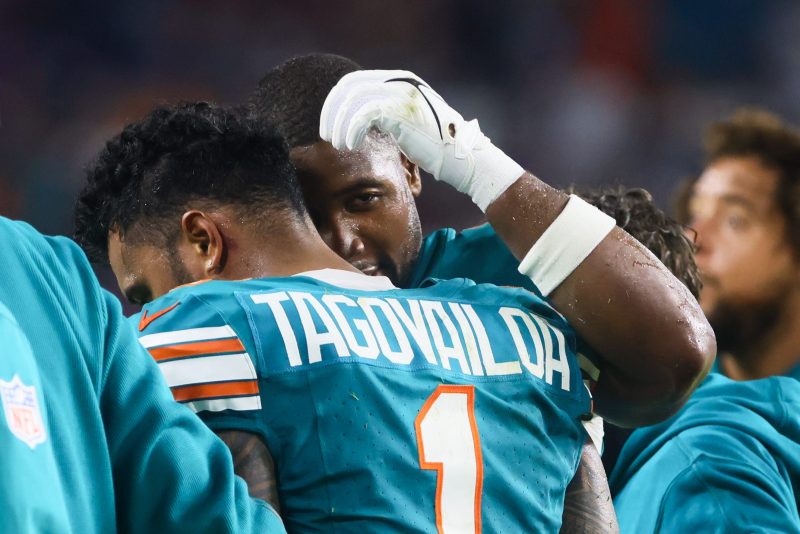
We shouldn’t tell Tua Tagovailoa to retire. But his family should.
We’ve seen this picture before with Tua Tagovailoa. This frightening, scary picture. Him on the ground. Appearing unconscious. Players frantically waving for the medical staff to come onto the field. Players taking a knee around him. A stadium shocked. People praying. Announcers speaking in hushed tones. Everyone wondering the same thing…
Is he okay? Is he gonna get up? Again? It happened to him again? He’s in that horrific position on the ground again?
Dolphins offensive lineman Austin Jackson told the media after the game that he was one of the players closest to Tagovailoa and could see in Tagovailoa’s eyes that he ‘wasn’t there all the way.’ Jackson said he almost immediately took a knee. Skylar Thompson, the Dolphins’ backup quarterback, said what many of us were thinking after watching Tagovailoa go down. “It makes me sick,’ he said. ‘Everybody in the organization would say the same thing. So just really praying for Tua and hopefully everything will come out all right.”
We all hope that. But there is obviously a deeper conversation to be had here. It’s not an easy one. It’s immensely thorny and complicated. It centers on love and care and culpability. The NFL’s. Ours. His family. All of us need to take a moment and digest this: carefully, with decency and respect, but also a harsh eye.
Talk about all of it. Every piece like the fencing response, a sign of severe neurological trauma. Don’t look away. Don’t compartmentalize. Don’t minimize.
NFL STATS CENTRAL: The latest NFL scores, schedules, odds, stats and more.
Most of all, this is what all of us, but especially Tagovailoa and his family, need to think about. I’m not in the business of telling people what to do with their own lives. But I don’t ignore what I see with my own eyes and you don’t need to be a brain expert to understand that what Tagovailoa is going through is extremely dangerous. You do not need to be an expert to know that repeated concussions aren’t good for his long-term, well, existence.
Talk about it all. The conclusion that he and his family might come to is that it’s worth the risk. Tagovailoa may think he’s creating generational wealth, so he needs to play. But maybe someone in his family can point out that Tagovailoa’s last deal paid him close to $100 million in guaranteed money at signing.
There’s complicity from all of us in watching this beautiful but violent game. Football can be so brutal that the person Tagovailoa collided with was Damar Hamlin, who had to be brought back to life on the field.
We cover it, are obsessed with it, roster our fantasy teams, posit ourselves on the couch with our popcorn. Yet while the NFL can sometimes forget what it means to be human, we don’t have to feel that way. We can remember and pause and see what’s happening to Tagovailoa and think about him as a person.
This is Tagovailoa’s third diagnosed concussion in the NFL. The way the others happened were so horrific, so remarkably mishandled, that the NFL changed how concussions were dealt with. No league has mishandled the issue of head trauma as poorly as the NFL. The league has dragged its feet for decades on even acknowledging the long-term effects of head trauma like CTE. So for them to take that type of drastic action, so quickly, tells you how bad the situation was.
In 2022, he hit the back of his head on the ground in a game against Buffalo. He attempted to walk but stumbled back to the Dolphins’ huddle. He briefly left the game with what was incredibly described as a back issue.
The NFL and NFLPA opened a joint investigation into the incident. The union used its collectively bargained right to fire the unaffiliated neurological consultant who cleared Tagovailoa to return to the game. The league altered its concussion policy to include a spotter who has the power to remove a player from a contest if a player exhibits concussion symptoms.
Four days later against Cincinnati, Tagovailoa hit the back of his head on the ground and fell unconscious. He was taken to a local hospital and diagnosed with a concussion. He sustained another concussion later in the season against Green Bay.
Also, remember, Tagovailoa had a concussion as a player at Alabama.
This is the Tagovailoa story. His story. His family’s story.
Tagovailoa said during an interview with ‘The Dan Le Batard Show’ in August that his mother asked him to reconsider playing football.
Hopefully, conversations like that are happening again.
